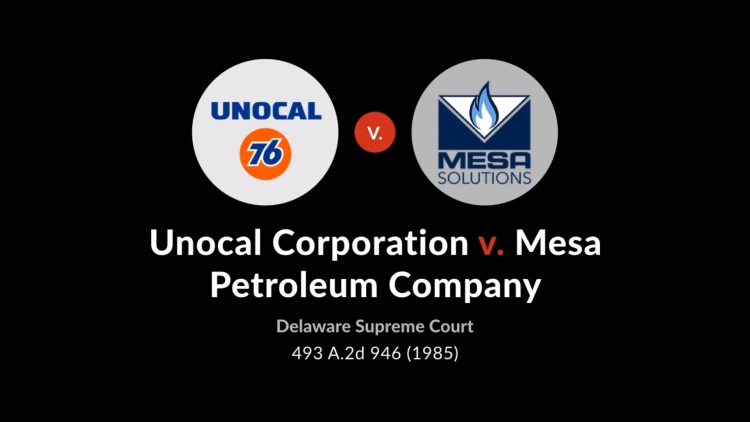Unocal Corporation v. Mesa Petroleum Co.
Delaware Supreme Court
493 A.2d 946 (1985)

- Written by Sean Carroll, JD
Facts
Mesa Petroleum Co. (Mesa) (plaintiff) owned 13 percent of the stock of Unocal Corporation (Unocal) (defendant). Mesa submitted a two-tier cash tender offer for an additional 37 percent of Unocal stock at a price of $54 per share. The securities that Mesa offered on the back end of the two-tiered tender offer were highly subordinated junk bonds. With the assistance of outside financial experts, the Unocal board of directors determined that the Mesa offer was completely inadequate because the value of Unocal stock on the front end of such a sale should have been at least $60 per share, and the junk bonds on the back end were worth far less than $54 per share. To oppose the Mesa offer and provide an alternative to Unocal’s shareholders, Unocal adopted a selective exchange offer whereby Unocal would self-tender its own shares to its stockholders for $72 per share. The Unocal board also determined that Mesa would be excluded from the offer. The board approved this exclusion because if Mesa was able to tender the Unocal shares, Unocal would effectively subsidize Mesa’s attempts to buy Unocal stock at $54 per share. In sum, the Unocal board’s goal was either to win out over Mesa’s $54 per share tender offer or, if the Mesa offer was still successful despite the exchange offer, to provide the Unocal shareholders that remained with an adequate alternative to accepting the junk bonds from Mesa on the back end. Mesa brought suit, challenging Unocal’s exchange offer and its exclusion of Mesa. The Delaware Court of Chancery granted a preliminary injunction to Mesa, enjoining Unocal’s exchange offer. Unocal appealed.
Rule of Law
Issue
Holding and Reasoning (Moore, J.)
What to do next…
Here's why 911,000 law students have relied on our case briefs:
- Written by law professors and practitioners, not other law students. 47,100 briefs, keyed to 997 casebooks. Top-notch customer support.
- The right amount of information, includes the facts, issues, rule of law, holding and reasoning, and any concurrences and dissents.
- Access in your classes, works on your mobile and tablet. Massive library of related video lessons and high quality multiple-choice questions.
- Easy to use, uniform format for every case brief. Written in plain English, not in legalese. Our briefs summarize and simplify; they don’t just repeat the court’s language.





